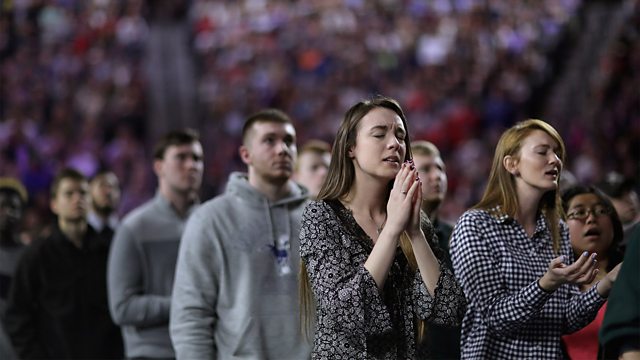Evangelical or political Christianity?
Michael Goldfarb explores "evangelical" and "political" Christianity in the US.
One of the founding principles of the United States is that religion and politics, church and state, are separate. Yet today in America religious belief and politics have become inseparable. Self-styled "evangelical" Christians have become the dominant grassroots force in the Republican Party. "Evangelical" is not a denomination, it can mean different things to different people in terms of religious doctrine. The unifying principle seems to be in the political outlook of its adherents: deeply conservative in the 21st century American political context. How did this happen and what does this have to do with faith? Is American "evangelical" Christianity more a form of politics than religion?
Michael Goldfarb explores the irony of how the word evangelical came to replace protestant - with its political inference that it is a form of "protest" - as the preferred name for the majority of America's Christians. Around one-third of Americans identify as evangelical Christians. He looks back at earlier surges of religious fervour that have marked American history, so far there have been four "Great Awakenings", and wonders if the current upsurge marks a fifth.
Reporting from the American heartland, speaking with evangelical pastors, their flocks and students, Michael explores the tension between a life of Christian faith and the dirty realities of secular politics.
(Photo: Thousands of students, supporters and invited guests sing songs of Christian praise before Republican presidential candidate Donald Trump delivers the convocation in the Vines Center, Liberty University campus, 18 January, 2016 in Lynchburg, Virginia. Credit: Chip Somodevilla/Getty Images)
Last on
More episodes
Broadcasts
- Fri 26 May 2023 03:32GMT91�ȱ� World Service
- Fri 26 May 2023 10:32GMT91�ȱ� World Service
- Fri 26 May 2023 21:32GMT91�ȱ� World Service except East and Southern Africa, Europe and the Middle East & West and Central Africa
- Fri 26 May 2023 22:32GMT91�ȱ� World Service Europe and the Middle East & 91�ȱ� Afghan Radio
- Sat 27 May 2023 15:32GMT91�ȱ� World Service News Internet
Podcast
-
![]()
Heart and Soul
Personal approaches to religious belief from around the world.


